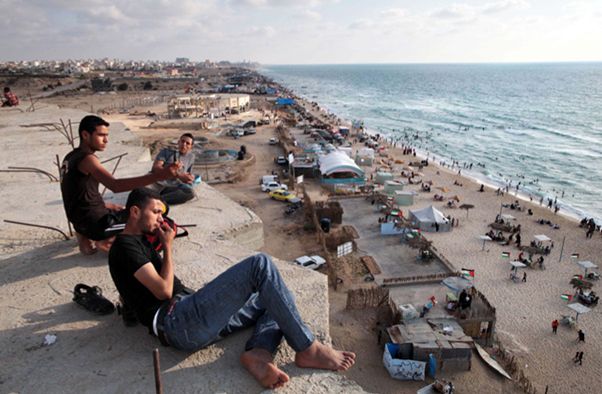São Paulo – The author of Gaza, the documentary film that kicked off the 2020 Arab World Film Festival at Home, filmmaker Garry Keane discussed how his experiences in Palestine changed his life. The feature film is a rich portrayal of the daily lives of the people who live and resist in the Gaza Strip, a Palestinian territory struggling under Israeli blockade and conflicts. “You cannot leave Gaza and go home without (…) being thankful for what we have. It’s given me a focus that I’ll never lose. I’m in touch with Gaza every single day, we’re fundraising all the time for charities,” the Irishman said during an online conversation within the Festival this Friday (11). The event will continue on its standalone platform through September 13, and from August 31 to September 27 on on the SESC Digital website.
Gaza (screenshot above) was nominated for the 2019 Sundance Film Festival. The movie premiered in 2019 but was filmed years earlier, and the director has had a connection with Palestinians ever since. “We do see the little things that we do making a difference, we absolutely do. Whether it’s, you know, raising a few thousands and seeing pictures of fruit baskets being delivered (…). After Covid we’re organizing sanitizers and masks (…). You can do things, everyone can do things. We have a mission now, a mission that will go to our graves. Fighting for… And this film was just the start.”
Keane was joined in the conversation by Arlene Clemesha, a professor of contemporary Arab history at the University of São Paulo (USP) and former Brazilian civil society representative with the United Nations’ International Palestine Network (UN-ICNP). The moderator was Diogo Bercito, a journalist at newspaper Folha de São Paulo who specializes in the Arab World and author of the Orientalíssimo blog.

Clemesha said the film’s relevance arises from its portraying the area as something other than a perpetual conflict zone. “This characterization as a conflict zone is created from the outside looking in. That’s not the reality of those people, that’s not how they see themselves or how History portrays that region. Indeed, there’s much more to it than just that. It dehumanizes the people who live there, and it’s part of a process of domination. It’s a complex process, one which Garry’s film manages to deconstruct.”
Bercito mentioned the film’s depiction of the seaside. “The idea that the Strip is connected to the sea, to fishing, but also leisure. The idea that the ocean is the only horizon for many of the residents.” Keane remarked that the sea is an important thing for the people of Gaza: “We did a lot of work with people along the sea. We did a lot of filming in the sea, and under the sea, or on the sea, because we felt that’s so strong. One of the saddest things for us as observers, as well as filmmakers, was when we were there, 2015, we shot a lot of the beach sequences in 2015. Every evening, you’d go down and the whole of Gaza was on the beach. They’ pray on the beach, they’d party on the beach, they’d sing and dance and it was such as joyous place.”
“The sad thing was by 2018, because of the electricity shortages and all of the sewage treatment plants that closed down, and the entire water table was polluted, people had to stop swimming in the sea and had to stop going to the shoreline. So that was a tragedy. It’s progressively getting worse and worse. It’s a place with 2 million people. They can’t sustain this blockade any longer. The sea is the only place where they can’t see the borders, they can’t see that they’re imprisoned,” Garry Keane said.
The Arab World Film Festival is hosted by the Institute of Arab Culture (ICArabe), co-hosted by SESC São Paulo, and sponsored by the Arab Brazilian Chamber of Commerce (ABCC), with support from Instituto do Sono and the Federation of Muslim Associations in Brazil (Fambras).
You can watch the full conversation here (questions are in Portuguese, answers in English):
Translated by Gabriel Pomerancblum




